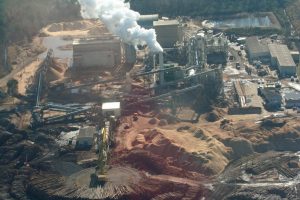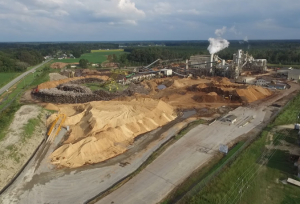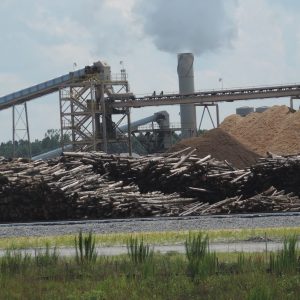Wood Bioenergy Project
Over the last decade, a rapidly expanding but destructive industry has grown in the U.S. based on cutting down forests to convert the wood into pellets for burning in power plants, mostly in Europe. The industry promotes itself as a “climate friendly” alternative to burning coal. But in reality, the manufacture and burning of wood pellets creates large amounts of air pollution—frequently illegally—and destroys woodlands needed for wildlife habitat, water filtration, the production of oxygen, and the sequestration of carbon dioxide. EIP’s work has revealed that more than half of the U.S. wood pellet plants built to feed foreign demand for biomass are emitting illegal air pollution or have failed to install legally-required pollution controls.
Mission:
Limit the growth of the wood bioenergy industry in the United States and the associated climate change driven by deforestation and air pollution.
 Guiding Principles:
Guiding Principles:
- Burning wood biomass to produce energy generally produces more carbon emissions than burning fossil fuels per unit of electricity generated. Further, producing and burning wood biomass releases air toxics and other pollutants.
- Successful advocacy depends on building partnerships with national, regional and local environmental, public health, and community organizations.
Current Strategies:
- Review Clean Air Act permits for existing and proposed wood bioenergy plants to ensure that facilities are required to comply with all applicable aspects of the Clean Air Act.
- Challenge permits in state and federal proceedings when permits fail to restrict pollution to legal levels or otherwise allow plants to skirt Clean Air Act requirements.
- Partner with organizations, such as Dogwood Alliance, Partnership for Policy Integrity, and Our Children’s Earth and Natural Resources Defense Council to educate the general public and impacted communities about bioenergy pollution.
 Progress:
Progress:
- Since the Wood Bioenergy Project’s January 2017 inception, we have identified systemic deficiencies in Clean Air Act permits for wood pellet plants, challenged permits in seven states, and built a coalition dedicated to ensuring that bioenergy facilities comply with stringent air pollution control requirements.
- We have developed considerable expertise in bioenergy plant emissions and technology, making us very effective at identifying Clean Air Act violations and challenging inadequate permits.
Research:
- Our investigation revealed all wood pellet production plants permitted prior to 2014 dramatically underestimated projected air pollution levels, resulting in construction permits that unlawfully exclude air pollution control requirements for large air polluters. Moreover, states are attempting to renew these permits without addressing this ongoing noncompliance.
- We discovered that numerous existing wood pellet production facilities are violating Clean Air Act requirements and that many proposed facilities are holding lax construction permits requiring inadequate pollution control.
Action:
 We filed comments on wood pellet and biomass power plant permits in North Carolina, South Carolina, Georgia, Michigan, Mississippi, Texas, Alabama, Louisiana and Florida raising an array of Clean Air Act compliance issues.
We filed comments on wood pellet and biomass power plant permits in North Carolina, South Carolina, Georgia, Michigan, Mississippi, Texas, Alabama, Louisiana and Florida raising an array of Clean Air Act compliance issues.- We opposed U.S. EPA’s proposed approval of a Georgia regulation that exempts bioenergy plants from certain Clean Air Act preconstruction permitting requirements.
- We are developing strategies to address Clean Air Act violations at facilities where no permit proceedings are imminent and to block facility construction authorized by deficient permits.
Results:
- Submitted comments on behalf of more than half a dozen environmental groups to the Mississippi Department of Environmental Quality on Pinnacle Renewable Energy’s proposed air pollution control permit for a major new pellet plant. Several weeks later, the company withdraw the application.
- Agreed to a settlement with Enviva to reduce harmful volatile organic compounds (or VOC) air pollution from smokestacks by at least 95 percent at a new biomass plant in Richmond County, North Carolina.
- Convinced Florida to require the Enviva Cottondale plant to undergo “after-the-fact” preconstruction review to identify additional controls that it must install pursuant to Clean Air Act requirement that it use “best available control technology” and persuaded Florida to reject company’s claim that installation of new controls would be uneconomical.
- Persuaded South Carolina to incorporate an enforceable wood pellet production limit into the air permit for the Enviva Pellets Greenwood plant.
- Successfully advocated for Texas to withdraw its proposed determination that the German Pellets Texas plant did not need to install additional pollution controls, and to instead instruct the company that the suite of controls identified in our comments are presumptively required.
- Convinced Georgia to require Varn Wood Products to significantly reduce its maximum wood pellet production rate and to propose extensive new air pollution testing and monitoring of air pollution from the Appling Wood Pellet Plant.
- Pressured the Northampton plant in North Carolina into installing extensive pollution controls.
- Prompted Virginia to direct the Southampton Plant to perform long-overdue air pollution testing.
- Negotiated for the Alabama MRE Crossville plant to abandon its claim that it is a “minor” emissions source and to instead obtain a Clean Air Act Title V operating permit as a “major” source, and to abide by interim wood pellet production limits until final permit issuance.
Other:
- The Hilton Head Island Packet published an informative video news story about EIP’s September 2020 legal action against a South Carolina wood pellet manufacturer for ongoing Clean Air Act violations:


